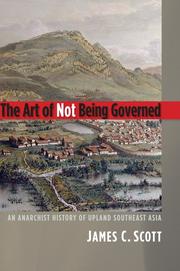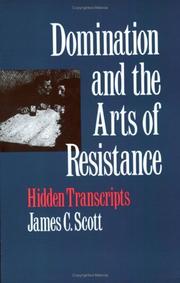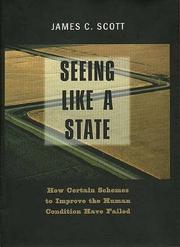| Listing 1 - 10 of 25 | << page >> |
Sort by
|
Book
ISBN: 9780691155296 0691155291 0691161038 1283646218 1400844622 Year: 2012 Publisher: Princeton, N.J. Princeton University Press
Abstract | Keywords | Export | Availability | Bookmark
 Loading...
Loading...Choose an application
- Reference Manager
- EndNote
- RefWorks (Direct export to RefWorks)
Political philosophy. Social philosophy --- Anarchism. --- Anarchisme

ISBN: 9780300152289 9780300169171 Year: 2009 Volume: *2 Publisher: New Haven, Conn. Yale University Press
Abstract | Keywords | Export | Availability | Bookmark
 Loading...
Loading...Choose an application
- Reference Manager
- EndNote
- RefWorks (Direct export to RefWorks)
Political systems --- Zomia --- Ethnology --- Peasants --- Anthropologie sociale et culturelle --- Paysannerie --- Political activity --- Activité politique --- Southeast Asia --- Asie du Sud-Est --- Politics and government --- Rural conditions. --- Politique et gouvernement --- Conditions rurales --- Activité politique --- Ethnologie

ISBN: 0300047053 9780300056693 9780300047059 0300056699 Year: 1990 Publisher: New Haven, Conn. Yale University Press
Abstract | Keywords | Export | Availability | Bookmark
 Loading...
Loading...Choose an application
- Reference Manager
- EndNote
- RefWorks (Direct export to RefWorks)
Dominance (Psychologie) --- Dominance (Psychology) --- Dominantie (Psychologie) --- Groepsdynamiek --- Group dynamics --- Groupes sociaux --- Human relations --- Intermenselijke relaties --- Interpersonal relations --- Lien social --- Liens sociaux --- Lijdelijk verzet --- Macht (Sociale wetenschappen) --- Menselijke relaties --- Passieve tegenstand --- Passieve weerstand --- Passive resistance --- Personal relations --- Political power --- Pouvoir (Sciences sociales) --- Power (Social sciences) --- Rapports humains --- Rapports interpersonnels --- Rapports sociaux --- Relaciones humanas --- Relaties [Intermenselijke ] --- Relaties [Menselijke ] --- Relations [Interpersonal ] --- Relations humaines --- Relations interpersonnelles --- Relations sociales --- Relationships [Interpersonal ] --- Rencontres interpersonnelles --- Résistance passive --- Sociabilité --- Social behavior --- Social groups --- Sociale groepen --- Tegenstand [Passieve ] --- Verzet [Lijdelijk ] --- Weerstand [Passieve ] --- Groupes, Dynamique des --- 844 Sociale structuur --- 826 Imperialisme, kolonialisme --- 316.344.4 --- 323.25 --- 316.472.3 --- 316.723 --- #SBIB:324H73 --- Association --- Groups, Social --- Associations, institutions, etc. --- Social participation --- Empowerment (Social sciences) --- Exchange theory (Sociology) --- Political science --- Social sciences --- Sociology --- Consensus (Social sciences) --- Nonviolent noncooperation --- Resistance, Passive --- Satyagraha --- Direct action --- Nonviolence --- Interpersonal relationships --- Relations, Interpersonal --- Relationships, Interpersonal --- Social psychology --- Object relations (Psychoanalysis) --- Social hierarchy (Psychology) --- Control (Psychology) --- Macht. Sociale structuren --(sociale stratificatie) --- Burgerlijke ongehoorzaamheid. Passieve weerstand. Geweldloos verzet. Sociale verdediging --- Alienation. Vervreemding in groep-individu relaties --- Subculturen --(sociologie) --- Politieke verandering: oppositie en minderheid, protest, politiek geweld --- Interpersonal relations. --- Passive resistance. --- Social groups. --- 316.723 Subculturen --(sociologie) --- 316.472.3 Alienation. Vervreemding in groep-individu relaties --- 323.25 Burgerlijke ongehoorzaamheid. Passieve weerstand. Geweldloos verzet. Sociale verdediging --- 316.344.4 Macht. Sociale structuren --(sociale stratificatie) --- Dominance (Psychology). --- Power (Social sciences). --- Résistance passive --- Social stratification --- Community organization --- VIE POLITIQUE --- COMPORTEMENT POLITIQUE --- SYSTEMES DE VALEURS --- POUVOIR

ISBN: 0300021909 0300018622 0300185553 1283950235 9780300185553 9780300018622 9780300021905 9781283950237 Year: 1976 Volume: 315 Publisher: New Haven, Conn. Yale University Press
Abstract | Keywords | Export | Availability | Bookmark
 Loading...
Loading...Choose an application
- Reference Manager
- EndNote
- RefWorks (Direct export to RefWorks)
James C. Scott places the critical problem of the peasant household-subsistence-at the center of this study. The fear of food shortages, he argues persuasively, explains many otherwise puzzling technical, social, and moral arrangements in peasant society, such as resistance to innovation, the desire to own land even at some cost in terms of income, relationships with other people, and relationships with institutions, including the state. Once the centrality of the subsistence problem is recognized, its effects on notions of economic and political justice can also be seen. Scott draws from the history of agrarian society in lower Burma and Vietnam to show how the transformations of the colonial era systematically violated the peasants' "moral economy" and created a situation of potential rebellion and revolution. Demonstrating keen insights into the behavior of people in other cultures and a rare ability to generalize soundly from case studies, Scott offers a different perspective on peasant behavior that will be of interest particularly to political scientists, anthropologists, sociologists, and Southeast Asianists."The book is extraordinarily original and valuable and will have a very broad appeal. I think the central thesis is correct and compelling."-Clifford Geertz "In this major work, ... Scott views peasants as political and moral actors defending their values as well as their individual security, making his book vital to an understanding of peasant politics."-Library Journal James C. Scott is professor of political science at Yale University.
Peasants --- Peasant uprisings --- Agriculture --- Economic aspects --- Southeast Asia --- Social conditions. --- Peasants' uprisings --- Uprisings, Peasant --- Peasantry --- Insurgency --- Revolutions --- Agricultural laborers --- Rural population --- Marks (Medieval land tenure) --- Villeinage --- History of Asia --- anno 1920-1929 --- anno 1930-1939 --- Myanmar --- Vietnam --- Paysannerie --- Asie du Sud-Est --- Conditions rurales
Book
ISBN: 9780300182910 0300182910 Year: 2017 Publisher: New Haven, Conn. Yale University Press
Abstract | Keywords | Export | Availability | Bookmark
 Loading...
Loading...Choose an application
- Reference Manager
- EndNote
- RefWorks (Direct export to RefWorks)
An account of all the new and surprising evidence now available for the beginnings of the earliest civilizations that contradict the standard narrative. Why did humans abandon hunting and gathering for sedentary communities dependent on livestock and cereal grains, and governed by precursors of today's states? Most people believe that plant and animal domestication allowed humans, finally, to settle down and form agricultural villages, towns, and states, which made possible civilization, law, public order, and a presumably secure way of living. But archaeological and historical evidence challenges this narrative. The first agrarian states, says James C. Scott, were born of accumulations of domestications: first fire, then plants, livestock, subjects of the state, captives, and finally women in the patriarchal family-all of which can be viewed as a way of gaining control over reproduction. Scott explores why we avoided sedentism and plow agriculture, the advantages of mobile subsistence, the unforeseeable disease epidemics arising from crowding plants, animals, and grain, and why all early states are based on millets and cereal grains and unfree labor. He also discusses the "barbarians" who long evaded state control, as a way of understanding continuing tension between states and nonsubject peoples.
Agriculture --- Agriculture and state --- Farming --- Husbandry --- Industrial arts --- Life sciences --- Food supply --- Land use, Rural --- Agrarian question --- Agricultural policy --- State and agriculture --- Economic policy --- Land reform --- Origin of agriculture --- Agriculture, Prehistoric --- Domestication --- Origin. --- History. --- Social aspects --- Government policy --- History --- #SBIB:39A3 --- #SBIB:39A4 --- Antropologie: geschiedenis, theorie, wetenschap (incl. grondleggers van de antropologie als wetenschap) --- Toegepaste antropologie --- Politique agricole --- Origines --- Histoire --- Ancient history --- Political philosophy. Social philosophy --- World history --- Prehistory --- Origin --- Social aspects&delete&

ISBN: 0585377510 9780585377513 9780300153569 0300153562 0300047053 0300056699 9780300047059 9780300056693 0300056699 Year: 1992 Publisher: [Place of publication not identified] Yale University Press
Abstract | Keywords | Export | Availability | Bookmark
 Loading...
Loading...Choose an application
- Reference Manager
- EndNote
- RefWorks (Direct export to RefWorks)
"Play fool, to catch wise."-proverb of Jamaican slaves Confrontations between the powerless and powerful are laden with deception-the powerless feign deference and the powerful subtly assert their mastery. Peasants, serfs, untouchables, slaves, laborers, and prisoners are not free to speak their minds in the presence of power. These subordinate groups instead create a secret discourse that represents a critique of power spoken behind the backs of the dominant. At the same time, the powerful also develop a private dialogue about practices and goals of their rule that cannot be openly avowed. In this book, renowned social scientist James C. Scott offers a penetrating discussion both of the public roles played by the powerful and powerless and the mocking, vengeful tone they display off stage-what he terms their public and hidden transcripts. Using examples from the literature, history, and politics of cultures around the world, Scott examines the many guises this interaction has taken throughout history and the tensions and contradictions it reflects. Scott describes the ideological resistance of subordinate groups-their gossip, folktales, songs, jokes, and theater-their use of anonymity and ambiguity. He also analyzes how ruling elites attempt to convey an impression of hegemony through such devices as parades, state ceremony, and rituals of subordination and apology. Finally, he identifies-with "ations that range from the recollections of American slaves to those of Russian citizens during the beginnings of Gorbachev's glasnost campaign-the political electricity generated among oppressed groups when, for the first time, the hidden transcript is spoken directly and publicly in the face of power. His landmark work will revise our understanding of subordination, resistance, hegemony, folk culture, and the ideas behind revolt.
Passive resistance --- Power (Social sciences) --- Dominance (Psychology) --- Interpersonal relations --- Social groups --- Association --- Group dynamics --- Groups, Social --- Associations, institutions, etc. --- Social participation --- Human relations --- Interpersonal relationships --- Personal relations --- Relations, Interpersonal --- Relationships, Interpersonal --- Social behavior --- Social psychology --- Object relations (Psychoanalysis) --- Social hierarchy (Psychology) --- Control (Psychology) --- Empowerment (Social sciences) --- Political power --- Exchange theory (Sociology) --- Political science --- Social sciences --- Sociology --- Consensus (Social sciences) --- Nonviolent noncooperation --- Resistance, Passive --- Satyagraha --- Direct action --- Nonviolence

ISBN: 1282352644 9786612352645 0300156529 9780300156522 9781282352643 0300152280 9780300152289 9780300169171 0300169175 9780300152289 Year: 2009 Publisher: New Haven Yale University Press
Abstract | Keywords | Export | Availability | Bookmark
 Loading...
Loading...Choose an application
- Reference Manager
- EndNote
- RefWorks (Direct export to RefWorks)
For two thousand years the disparate groups that now reside in Zomia (a mountainous region the size of Europe that consists of portions of seven Asian countries) have fled the projects of the organized state societies that surround them-slavery, conscription, taxes, corvée labor, epidemics, and warfare. This book, essentially an "anarchist history," is the first-ever examination of the huge literature on state-making whose author evaluates why people would deliberately and reactively remain stateless. Among the strategies employed by the people of Zomia to remain stateless are physical dispersion in rugged terrain; agricultural practices that enhance mobility; pliable ethnic identities; devotion to prophetic, millenarian leaders; and maintenance of a largely oral culture that allows them to reinvent their histories and genealogies as they move between and around states.In accessible language, James Scott, recognized worldwide as an eminent authority in Southeast Asian, peasant, and agrarian studies, tells the story of the peoples of Zomia and their unlikely odyssey in search of self-determination. He redefines our views on Asian politics, history, demographics, and even our fundamental ideas about what constitutes civilization, and challenges us with a radically different approach to history that presents events from the perspective of stateless peoples and redefines state-making as a form of "internal colonialism." This new perspective requires a radical reevaluation of the civilizational narratives of the lowland states. Scott's work on Zomia represents a new way to think of area studies that will be applicable to other runaway, fugitive, and marooned communities, be they Gypsies, Cossacks, tribes fleeing slave raiders, Marsh Arabs, or San-Bushmen.
Ethnology --- Peasants --- Peasantry --- Agricultural laborers --- Rural population --- Marks (Medieval land tenure) --- Villeinage --- Political activity --- Southeast Asia --- Asia, Southeast --- Asia, Southeastern --- South East Asia --- Southeastern Asia --- Politics and government --- Rural conditions.
Book
ISBN: 0131790185 Year: 1972 Publisher: Englewood Cliffs Prentice-Hall
Abstract | Keywords | Export | Availability | Bookmark
 Loading...
Loading...Choose an application
- Reference Manager
- EndNote
- RefWorks (Direct export to RefWorks)

ISBN: 0300070160 9781281729132 9780300128789 0300078153 Year: 1998 Publisher: New Haven, Conn. Yale University Press
Abstract | Keywords | Export | Availability | Bookmark
 Loading...
Loading...Choose an application
- Reference Manager
- EndNote
- RefWorks (Direct export to RefWorks)
Book
Year: 1985 Publisher: New Haven, Conn. Yale University Press
Abstract | Keywords | Export | Availability | Bookmark
 Loading...
Loading...Choose an application
- Reference Manager
- EndNote
- RefWorks (Direct export to RefWorks)
Community organization --- History of Asia --- anno 1900-1999 --- Malaysia
| Listing 1 - 10 of 25 | << page >> |
Sort by
|

 Search
Search Feedback
Feedback About UniCat
About UniCat  Help
Help News
News